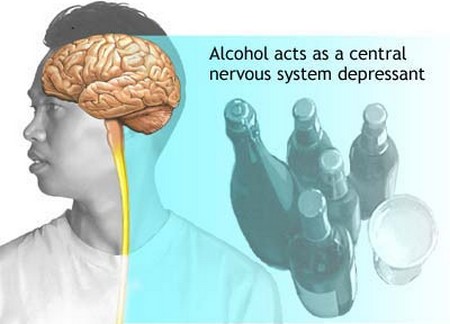When you are depressed, it is easy to turn to alcohol as a temporary escape from your reality. But this exacerbates the symptoms of depression and interferes with the treatment, as well as causing social and health problems. And on the biochemical front, alcohol is also a substance that blocks the conversion of fatty acid by interfering with the metabolic pathways of the omega-3 and omega-6 fatty acid chains and preventing essential fatty acids reaching the phospholipid layer in our brain. One of the problems with drinking to excess is that your habit can increase to unhealthy levels without you being aware of what is happening. Drinking is so much part of a modern social life; if you go out with friends you are expected to drink, and can be given a very hard time if you do not.
When you are experiencing the low mood of depression, which refuses to lift, it is tempting to dull your despair by drinking more and more, until your body becomes used to these new, higher levels of alcohol and you begin to crave the next drink. This can put an even greater strain on your relationships with family, friends and work colleagues than the symptoms of the depression itself. It also puts a strain on all your body systems. Obviously people’s tolerance to alcohol varies depending on your age, sex and general fitness, but one or two small glasses of wine a day is not considered damaging to your health. If you need some help fighting your addiction, visit https://tracieokeefe.com. You may also consider prp treatments and counseling to help fight your addiction.

If you think you might have a drink problem, ask yourself these questions:
- Do you ever feel guilty that you drink too much?
- Have other people commented on how much you drink?
- Do you drink at times of the day when other people don’t, like first thing in the morning or late into the night when everyone else has gone to bed?
- Has your intake of alcohol risen noticeably recently?
- Has alcohol interfered with your work or your home life because of hangovers, bad temper or accidents?
- If you have answered ‘yes’ to two or more, you are probably drinking more than is healthy for you, and you should consider changing your drinking habits. If need be, visit your doctor and talk to them about the problem, or try these strategies for reducing your consumption.
- Don’t stock alcohol in large quantities at home. If it isn’t there, you can’t drink it.
- Try not to drink alone. It is easier to ignore how much you are drinking if you are alone.
- If you are meeting friends, always make the first drink a soft one, and say you will have a ‘proper’ one later. For many people it is that first drink that sets the tone for the evening. If you have a soft drink first, the moment passes and so does the immediate need for alcohol.
- Have a few alcohol-free days each week.
- Avoid friends who drink heavily. People who drink heavily inevitably seek out others who have the same habit, and this is often the biggest hurdle to get over when you are reducing your intake. Try to stick with your more abstemious friends.
- Drink water as well as alcohol, between drinks and particularly before going to bed to reduce the effect on your liver and help flush out the toxins more quickly.
- Never drink on an empty stomach.
- If you feel you have a serious addiction to alcohol and want to give up, contact Alcoholics Anonymous. The association has a high level of success in controlling your habit.